The Prophecy of Tony Kushner Returns to Broadway with Angels in America
The National Theatre comes to New York with its revival of Kushner’s epic two-part play.
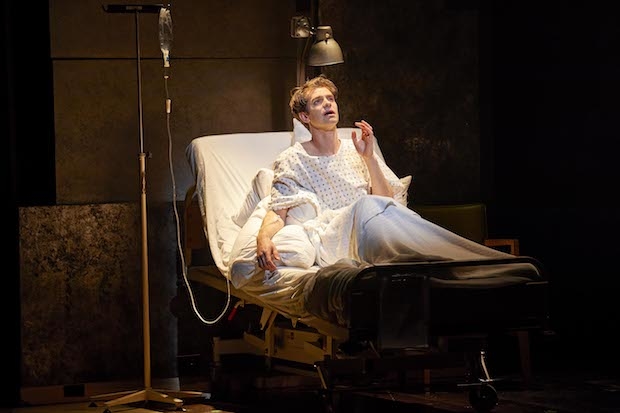
(© Brinkhoff-Moegenburg)
Rarely has a play arrived with as much earth-shaking vitality as Tony Kushner's Angels in America. That was as true during its 1991 premiere as it is today, when the first Broadway revival opens at the Neil Simon Theatre. This two-part drama looks deep into the soul of our country, establishing its relentless churn in Part 1 (Millennium Approaches) and breaking that machine in Part 2 (Perestroika). Given the hindsight of 27 years, it is no exaggeration to call Angels a genuine American masterpiece.
This first-rate production comes from London's West End, where it played an acclaimed run with the National Theatre last summer. It may seem strange that a foreign national theater would be the first to stage a Broadway revival of the most significant American drama of the last three decades (the company also produced the London premiere in 1992). But sometimes it takes an outsider's perspective to capture what is truly extraordinary about a place and time. Set mostly in New York around 1985-86, Angels weaves a mythic narrative around Cold War politics, AIDS, and a looming sense of Armageddon in a country widely misunderstood to have no mythic tradition.
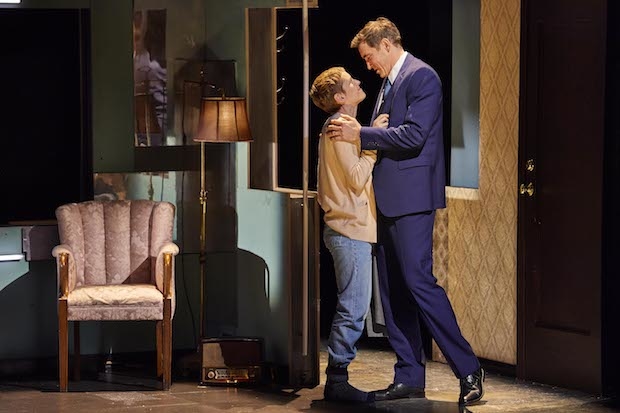
(© Brinkhoff-Moegenburg)
All the characters in Angels are outsiders in their own ways. Joe (Lee Pace) and his Valium-addicted wife, Harper (Denise Gough), are Utah Mormons transplanted to Brooklyn so Joe can work as chief clerk for a federal judge. Infamous right-wing operative Roy M. Cohn (Nathan Lane) is grooming Joe for a job in Washington so he can have a "Roy boy" in the justice department. Although his taste for men is an open secret, Cohn disdains self-identified gay men like Prior (Andrew Garfield) and Louis (James McArdle), not to mention black former drag queen Belize (Nathan Stewart-Jarrett). But when Prior is diagnosed with AIDS, he and Cohn share more in common than either would care to admit. As Prior becomes sicker, he begins to hear the voice of an angel (a hair-raisingly intense Amanda Lawrence) bearing a dark new prophecy. Meanwhile, the ghost of Ethel Rosenberg (Susan Brown) haunts Cohn, hoping to see him die a worse death than she did.
Director Marianne Elliott has already asserted her mastery of space and movement with her Tony-winning productions of War Horse and The Curious Incident of the Dog in the Night-Time. Her inventive physical staging proves an ideal match for Kushner's sprawling, cinematic, and magic-laden text. Elliott doesn't treat Kushner's penchant for overlapping scenes as an obstacle, but an opportunity for counterpoint. In the few scene locations that repeat, Elliot opts to rearrange our perspective on the space, like a film director setting up a new shot. We're never unclear about location, but the world comes into fuller focus as performance and design seamlessly integrate.
Over the course of nearly eight hours, Ian MacNeil's colossal set depicts the unraveling of the universe. A complicated labyrinth of rotating walls provides the scenery for much of Millennium Approaches. By Perestroika, it all falls away, leaving Elliot to build a new world out of the void. Lighting designer Paule Constable governs the porous border between fantasy and reality with her subliminal lighting, which beams magic from the heavens but can just as quickly snap back to unforgiving realism.
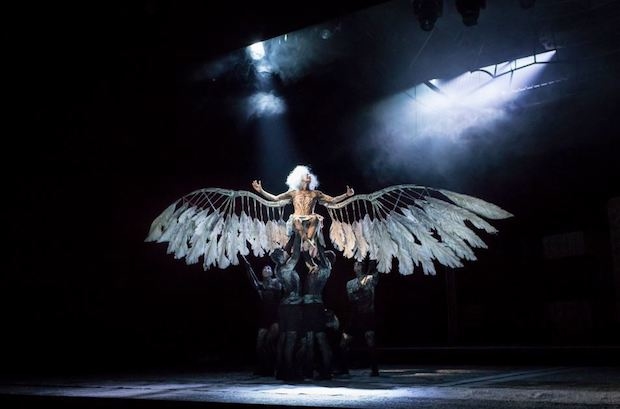
(© Brinkhoff-Moegenburg)
Every stitch of Nicky Gillibrand's stunning costumes furthers the story. She depicts the angel as both magnificent and sickly. A tattered American flag wraps around her waist, faded glory for an angel who has clearly seen better days. Puppetry director Finn Caldwell choreographs her flight with the aid of six "angel shadows" that take on an increasingly important role as the world disintegrates.
Ian Dickinson's shock-inducing sound design emphasizes the cinematic qualities of Kushner's script, as does Adrian Sutton's original music. Conjuring film noir, sci-fi, and horror, it references the popular culture that makes up the delicate ecology of our characters' delusions (if they truly are delusions). The entire design team shrewdly affirms that if there are to be American myths, they must spring from American forms.
That is surely why Garfield embodies Prior with the grandeur of Norma Desmond, rasping Prior's defiant fabulousness on behalf of millions of gay men. As Belize, Stewart-Jarrett powers queenliness with fiery passion. His scenes with McArdle (who masterfully tosses Louis's word salad) are among the most fun to watch, as Stewart-Jarrett throws shade with the velocity of a major-league pitcher.
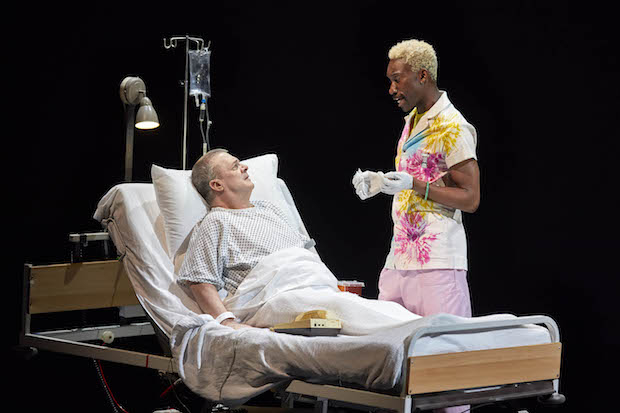
(© Brinkhoff-Moegenburg)
Belize's interactions with Cohn also crackle, although Lane makes Belize's compassion far more understandable with an unexpectedly vulnerable performance. Breaking through the granite-like hardness of the text, Lane portrays this legendary bugbear of liberalism as what he is: a man who is sick and dying. That corporeal frailty becomes crystal clear when Cohn lets out an evil cackle that reveals itself to be no more than a desperate wheeze in the stark light of actuality (brilliant assist by Constable).
As the pill-popping Harper, Gough effortlessly traverses fantasy and reality, bringing an equal amount of truth to both. Pace seems to drown in desperation as Joe grasps for salvation from his loneliness, a condition that persists at the end of the play. Joe's exclusion from Kushner's uplifting epilogue inserts a note of discord in an otherwise harmonious coda — a dissonance that sounds painfully prescient now that there's a Roy boy in the White House.
Where other plays dealing with AIDS and politics have come to sound dated, Angels in America has only grown more resonant. Kushner isn't just dealing in ephemera, but timeless themes of life and death. This is a play that reveals new secrets with each viewing, so you should never pass up a chance to see it — especially in a production this tremendous.
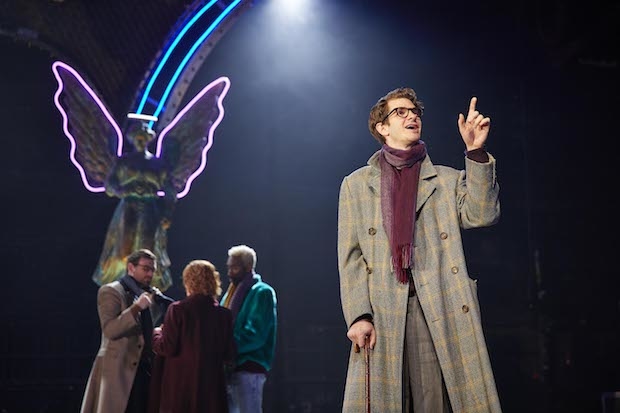
(© Brinkhoff-Moegenburg)










